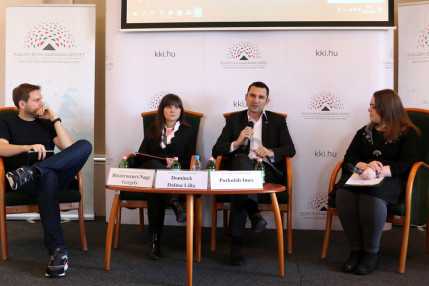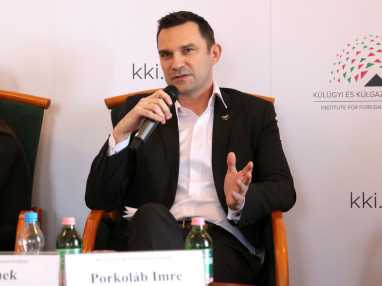Innovative National Defence
Szöveg: Balázs Trautmann | 2019. február 12. 7:12A round-table discussion titled ”Innovation in the Hungarian Defence Sector” took place in the Institute for Foreign Affairs and Trade (KKI) in the recent days attracting strong interest. The topic was extremely relevant, as the research and development challenges facing the domestic defence industry were discussed.

He welcomed Gergely Böszörményi-Nagy, the owner-manager of the Design Terminal, Dr. Dalma Lilla Dominek, the CEO of the Valor Hungariae Zrt. and Colonel Dr. Imre Porkoláb, the Deputy National Armament Director for Defence Innovation Research and Development of the Ministry of Defence among the lecturers of the event. The most prominent common idea of the three lectures heard was the importance of the capacity to identify the changes and to provide quick and effective responses to these, to adapt appropriately to the continuously and rapidly changing conditions.
As in his lecture Imre Porkoláb said: "NATO is an organisation that has adapted fairly much since its establishment. Starting from 1949 we speak about Collective Defense. As from the 90s the Partnerships for Peace, PfP were launched, the enlargements and a strategic change of direction took place. In 2001 the extraterritorial operations began, which can be read much in the press, too. Then in 2014 the Wales Summit brought another strategic change of direction. These periods, these time cycles tend to become increasingly shorter."

The colonel has also indicated that the security policy environment changed. The number of key actors changed as well, while until the fall of the Berlin wall we could speak about a predictable environment. Today in addition to the traditional theatres of war, thus the land, the sea, the air and the space, also the cyber space, the information theatre and the human dimension have lined up.
During the next 6-7 year’s development of the Hungarian Defence Forces a great emphasis will be laid on innovation and R&D. The colonel said that in the period still ahead of us from the National Defence and Armed Forces Development Program as many changes will happen as in the previous 20 years combined. "This program is not less than a digital transformation, which must be carried out in the Hungarian Defence Forces" – Colonel Imre Porkoláb pointed out. This is a giant challenge, announcements were made about the future technology, and further announcements are expected in this area. In addition to the procurements, we consider it important that the Hungarian Defence Forces be innovative.
After the lectures the questions from the rows of the audience were answered by the lecturers. During the Q&A session questions affected first of all the challenges of digitalisation, cyber warfare, the "reconciliation" of the start-up enterprises with the HDF organisational culture, the introduction of the culture necessary for innovation, and harmonising the procurement needs arising with innovation.